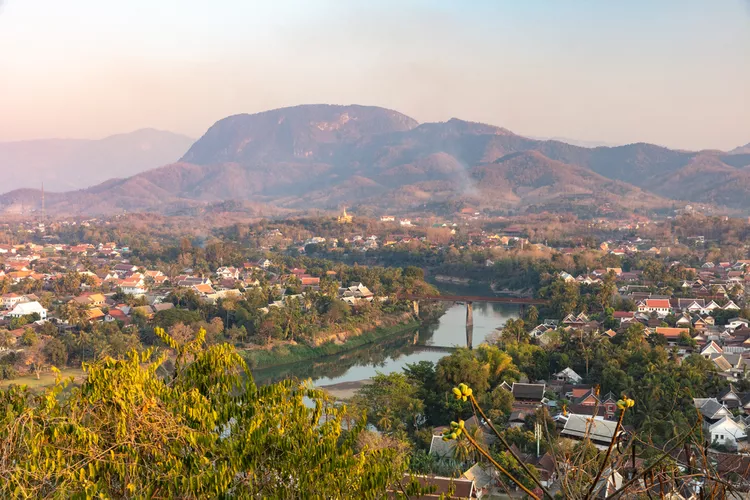Summary
Welcome to the Laotian city of Luang Prabang, nestled between the Mekong and Nam Khan rivers.
In the ancient city of Luang Prabang, even popular spots feel intimate. Boats cruise the Mekong River — almost all head out around golden hour and cruise through twilight — yet it seems as if you’re floating alone on this iconic waterway, which flows from China to Vietnam and through Northern Laos on its way.
As I lay on the wooden deck of a traditional slow boat, one that Sofitel Luang Prabang uses for guests, I watched the outline of the hills in the distance, and in the foreground, fishermen standing on their respective sampans. For a moment, time stood still; it was just the fishermen, me, and the Mekong.
Visitor numbers have surged here in recent months, mostly due to the border with neighboring China reopening. However, Luang Prabang remains relatively under the radar among U.S. travelers. Should someone arrive in the Laotian capital of Vientiane, they can access Luang Prabang via a new high-speed rail link that takes just two hours; the route will soon continue north and up to China. Moreover, if you’re like me, you will fly in from Bangkok. From there, Air Asia and Bangkok Airways offer daily service for the less than two-hour flight to Vientiane.
:max_bytes(150000):strip_icc():format(webp)/TAL-night-market-LUANGPRABANG0623-ba10df58adc542ce9cfd38c21eb966c3.jpg)
The Markets of Luang Prabang
Some 500,000 people, across more than 60 different ethnic groups, call Luang Prabang home, the Khmu, Lao Loum, and Hmong being the largest Indigenous nations. People here live a decidedly laid-back and unhurried life. This lifestyle starkly contrasts with neighboring Southeast Asian cities like Bangkok or Saigon, which offer international flights to this former royal capital.
In early May, the region was hot and steamy, the sky a hazy grayish-blue and permanently on the cusp of a storm that would provide temporary relief. I spent my early mornings and late evenings on the quietest streets of Luang Prabang, particularly the ones found on the promontory of the historic district between the Mekong and Nam Khan rivers, east of the Royal Palace. These streets contain the largest number of heritage buildings and provide a peaceful retreat from the bustle of the markets.
The morning market operates from around 5 a.m. to 10 a.m. daily, located in a mini-maze of alleys and backstreets near the center of town. It is the place to experience the local culture and how people here truly live. Most of the vendors, who sell everything from grilled sticky rice (khao jee) and mung bean coconut rice cakes to sun-cured pork naem — plus the day’s catch — are set up on the ground.
The night market operates from around 5 p.m. to 10 p.m. daily and is more of a tourist-focused affair, with an array of vendors setting up shop on streets closed to cars. While the red and blue tents along the main thoroughfare sell souvenirs and art pieces, the market also boasts street food galore, including Laotian baguettes, laap, and green papaya salad.
:max_bytes(150000):strip_icc():format(webp)/TAL-kuang-si-waterfalls-LUANGPRABANG0623-a5bc19ce8d6d43b0afa73ab60b7114ff.jpg)
Other Things to See and Do in Luang Prabang
Each day, in the pre-sunrise light, hundreds of saffron-clad monks silently walk single file through the streets of the old town. The daily Buddhist ritual of tak bat is the morning almsgiving ceremony. While visitors can observe the procession and even provide offerings, it’s crucial to remain respectful of this sacred tradition; this isn’t merely another photo opportunity.
For a more educational and private experience, Rosewood Luang Prabang offers an alms offering experience in Phanom Village, located on the outskirts of town. Noi, the hotel’s English-speaking monk-in-residence, guides you through the morning, which includes meditating in the temple, a life-symbolizing water ritual, and enjoying a local breakfast of khao piak sen (noodle soup).
Just a few miles outside of Luang Prabang, you’ll discover quaint dirt roads, gently flowing waters, and abundant virgin forests. Venture even further afield, about an hour from town, and you will be rewarded with a lush tropical jungle that holds Kuang Si Waterfalls, a series of cascading falls with milky turquoise waters. Here, you can wade into several of the natural pools and hike from the base of the falls to the top in about 30 minutes. To blend a scenic activity with a cultural one—and to make things more challenging—I trekked here from the local Khmu and Hmong village of Long Lao, completing a three-hour journey that concluded with a refreshing swim in the falls at the very end.
:max_bytes(150000):strip_icc():format(webp)/TAL-sofitel-luang-prabang-LUANGPRABANG0623-8ced8ee2cd2440a59addcb0cf986ce22.jpg)
Where to Stay in Luang Prabang
While it may be more commonly known as a backpackers’ town, Luang Prabang offers an array of luxury hotels, including Rosewood and Aman properties. Many of these accommodations feature small footprints (25 rooms or fewer) coupled with personalized service.
Rosewood Luang Prabang, nestled in a lush valley about 10 minutes from town by car, offers complimentary transit to and from the center. This property’s stunning grounds include its own waterfall and river. The Bill Bensley-designed hotel features an open-air lobby and restaurant as its centerpiece, with an oval-shaped pool in the background. Guests can choose from 23 rooms, including hilltop luxury tents and riverside villas with private plunge pools.
Centrally located just a few minutes’ walk from the old town, Amantaka features 24 luxurious suites clustered around a leafy courtyard. The classic Laotian style meshes seamlessly with 21st-century modernism, showcasing a variety of resort amenities, including a deep-green swimming pool, yoga studio, library, spa, and boutique.
For a premium option that’s slightly more affordable, the Sofitel Luang Prabang may be the perfect fit. Set within the walls of the former French governor’s residence, this hotel has 25 suites rich in Lao character, with each accommodation featuring a private garden complete with a gazebo and an outdoor bathtub or private plunge pool.




